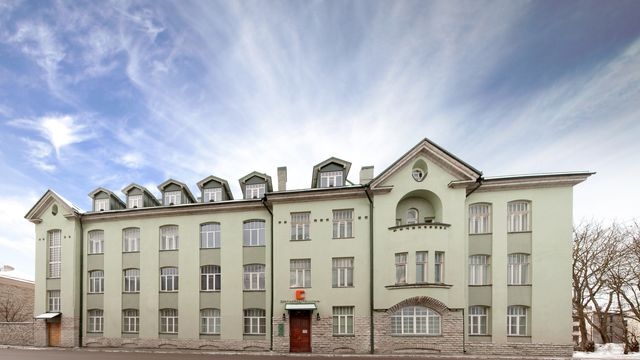
International Conference on Information Resources Management 2026
Theme: Responsible Digital Futures
Estonian Business School is excited to be hosting the International Conference on Information Resources Management (Conf–IRM) 2026.
- Location- Estonian Business School, A.Lauteri 3.
- Time - May 25-27, 2026
Sponsored by:

About the conference
As an affiliated conference of the Association for Information Systems (AIS), the International Conference on Information Resources Management (Conf-IRM) provides a vital peer-reviewed forum for researchers worldwide to share cutting-edge advancements in information systems and information management.
Building on the rich traditions of the former IRMA Conferences, Conf-IRM is dedicated to fostering a vibrant global network of scholars and practitioners. Our primary mission is to support the development of emerging researchers, and we warmly invite young scholars from around the world to join us for an event designed to provide substantive and beneficial feedback on their invaluable work.
This conference brings together researchers, educators, and practitioners in information systems to explore pathways toward responsible digital futures. In an era shaped by AI, datafication, and growing societal and environmental pressures, demands for accountability, transparency, and ethical digital technology deployment are intensifying. The theme emphasises critical and forward-thinking perspectives. With a developmental and interdisciplinary focus, the conference aims to foster dialogue that bridges theory and practice, global and regional insights, and technological advancement with human values.
Tallinn, Estonia offers the perfect setting to explore Responsible Digital Futures. As a world leader in e-governance, cybersecurity, and citizen-centric digital services, Estonia exemplifies both the promise and the complexity of life in a hyper-digital society. From pioneering digital identity systems to responding effectively to cyber threats, Tallinn provides a real-world backdrop for global dialogue on ethical, secure, and inclusive digital transformation.
Important Information
Call for papers
The organising committee invites you to submit your research work (full papers and research-in-progress), teaching cases, and proposals for panels and tutorials to Conf-IRM 2026. All conference submissions will be double-blind peer-reviewed and handled by the track and programme co-chairs.
- Submission deadline: January 18, 2026
- Notification of submission decision: March 15, 2026
- Final submission due date for accepted papers: March 25, 2026
- Early registration deadline: April 12, 2026
See the submission information below. For expressions of interest and any other questions, please contact contact@cognitosupport.ee.
Call for Doctoral Consortium
The 2026 International Conference on Information Resources Management (Conf-IRM) Doctoral Consortium invites submissions from doctoral students in the field of information systems (or a related discipline) who are currently in their dissertation stage.
- Submission deadline: February 15, 2026
- Notification of submission decision: March 15, 2026
- Final submission due date for accepted papers: March 25, 2026
- Early registration deadline: April 12, 2026
Registration Pricing and Categories
To register, please create an account in EDAS.
Below is a preview of the different registrations available and what they include.
Categories and Pricing
To qualify for the Early Bird discount, register before 12 April.
Programme
Conference Tracks
Below is the list of conference tracks and the contact information for their respective Track Co-Chairs (TCs).
Conference Tracks
- Jukka Veikko Mäkinen (Estonian Business School, Estonia), jukka.makinen@ebs.ee
- Malcolm Garbutt (University of Western Cape, South Africa), mgarbutt@uwc.ac.za
- Edward Bernroider (WU Vienna, Austria), edward.bernroider@wu.ac.at
- Barbara Krumay (Johannes Kepler University Linz, Austria), barbara.krumay@jku.at
- Maryam Mirzai (Auckland University of Technology, New Zealand), maryam.mirzaei@aut.ac.nz
- Najmeh Hafezieh (Royal Holloway, University of London, UK), najmeh.hafezieh@rhul.ac.uk
- Farjam Eshraghian (University of Westminster, UK), f.eshraghian@westminster.ac.uk
- Jairo Gutierrez (Auckland University of Technology, Auckland), jairo.gutierrez@aut.ac.nz
- Bilgin Metin (Bogazici University, Turkey), bilgin.metin@bogazici.edu.tr
- Anita Neumannova (WU Vienna, Austria), anita.neumannova@wu.ac.at
- Kasuni Weerasinghe (Auckland University of Technology, New Zealand), kasuni.weerasinghe@aut.ac.nz
- Regina Erlenheim (Estonian Business School, Estonia), regina.erlenheim@ebs.ee
- Eusebio Scornavacca (Arizona State University, Tempe, US), eusebio.scornavacca@asu.edu
- Iris Groher (Johannes Kepler University Linz, Austria), iris.groher@jku.at
- Soheil Human (WU Vienna, Austria), soheil.human@wu.ac.at
- Shafiq Alam (Massey University, New Zealand), salam1@massey.ac.nz
- Martin Stabauer (Johannes Kepler University Linz, Austria), martin.stabauer@jku.at
- Nazim Taskin (Bogazici University, Turkey), nazim.taskin@bogazici.edu.tr
- Kätlin Pulk (Estonian Business School, Estonia), katlin.pulk@ebs.ee
- Mathy Vandhana Sannasi (Royal Holloway, Univ. of London, UK), Mathy.Sannasi@rhul.ac.uk
- George Mangalaraj (Western Illinois University, US), g-mangalaraj@wiu.edu
- Aakash Taneja (Stockton University, US), aakash.taneja@stockton.edu
- Gunjan Mansingh (University of West Indies, Jamaica), gunjan.mansingh@uwimona.edu.jm
- Ahmed Doha (School of Business at Carleton University, Canada), ahmed.doha@carleton.ca
- Nikolaus Obwegeser (Berner Fachhochschule, Switzerland), nikolaus.obwegeser@bfh.ch
- Felix B Tan (Auckland University of Technology, Auckland, New Zealand), felix.tan@aut.ac.nz
- Anol Bhattacherjee (University of South Florida, US), abhatt@usf.edu
- Karmo Kroos (Estonian Business School, Estonia), karmo.kroos@ebs.ee
- Dirk Draheim (Tallinn University of Technology), dirk.draheim@taltech.ee.
- Barbara Krumay (Johannes Kepler Universitat Linz), barbara.krumay@jku.at
Submitting to Conf-IRM 2026
The EDAS conference management system will be used for all submissions. To ensure your submission is considered, please follow the submission process below:
- Access EDAS and Register: If you are a new user, please create a free account by following the registration instructions on their site at their EDAS website.
- Prepare Your Submission: Draft your work using the official Conf-IRM 2026 Submission Template. Submissions not conforming to the template will be desk-rejected. Download submission template
- Submit Your Work: Log in to EDAS, locate "Conf-IRM 2026" and the right track, and follow the prompts to upload your submission.
Submission types
Important notes
- The language of the conference is English.
- The number of submissions by an author (including joint authorship) is strictly limited to a maximum of two.
- Authors of accepted papers (at least one person per submission) and all panel members and tutorial presenters MUST register AND attend the conference.
- Submissions of ALL TYPES must be received by the above deadlines.
- Papers (Full-Length and Research-in-Progress) presented at the conference will be published in the conference proceedings. The proceedings will be ISBN and ISSN registered.
- Papers presented at the conference will also be placed in the AIS e-Library.
Publications and Proceedings Chair
- Lech Janczewski, The University of Auckland, New Zealand, l.janczewski@auckland.ac.nz
Conf-IRM Executive Committee
- Gerald Grant, Carleton University, Canada (co-chair), gerald.grant@carleton.ca
- Jairo Gutierrez, AUT University, New Zealand, jairo.gutierrez@aut.ac.nz
- G. Harindranath, Royal Holloway, University of London, g.harindranath@rhul.ac.uk
- Lech Janczewski, The University of Auckland, New Zealand (proceedings editor), lech@auckland.ac.nz
- Sherif Kamel, The American University in Cairo, Egypt, skamel@aucegypt.edu
- Barbara Krumay, Johannes Kepler University, Austria, barbara.krumay@jku.at
- Annette Mills, University of Canterbury, New Zealand, annette.mills@canterbury.ac.nz
- Felix B. Tan, AUT University, New Zealand (co-chair), felix.tan@aut.ac.nz
Conference Venue
Founded in 1988, EBS is the oldest privately owned business university in the Baltics. With more than 1100 students, EBS’s goal is to provide enterprising people with academic knowledge, skills and values for its successful implementation.
EBS offers degrees at Bachelor's, Master's as well as Doctoral levels.
Throughout its 36 years of operation, Estonian Business School has established itself as a highly esteemed provider of high-quality and practical business and entrepreneurship education. It continues to provide entrepreneurial knowledge and business education to future leaders, top specialists, managers and entrepreneurs.
- Conference Venue: Estonian Business School Campus, room 415
- Address: Estonian Business School, A. Lauteri 3, 10114, Tallinn, Estonia.
- Phone: +372 665 130

Directions to Estonian Business School
From Tallinn Airport:
Take the number 15 bus from the airport to the stop ‘Estonia’, then walk south for 2 minutes along A. Lauteri Street. The bus driver does not sell tickets, but you can tap on using the first orange payment terminal in the bus (closest to the driver) or buy a ticket online, which must also be redeemed at the front-most terminal (which is larger than the others in the bus).
Take a taxi:
Taxis in Tallinn are very affordable, and a taxi from the airport to EBS should be around 8 EUR. We recommend downloading and using the Bolt App, which also allows you to rent cars, bicycles and e-scooters.
Important Notes
- Bus drivers may not speak to you, as the transport system is fully digitalised and their English is limited. Information is available online and in the bus, in English, about how public transport works in Tallinn.
- Taxis are cheap and affordable. We recommend the Estonian company Bolt as the most reliable provider.
- The public transport system is integrated with Google Maps, which we recommend you use for directions.
Visiting Tallinn: What to Know
The Baltic region is simply gorgeous in the summer months with moderate temperatures and long daylight hours; Estonia’s capital, Tallinn, is one of the jewels.
The city has been notable since its days as part of the Hanseatic League of medieval trading cities. In recent years, Tallinn has become a place of a burgeoning startup scene and ecosystem with nearly 1,300 companies. Six of those startups have been classified as unicorns, making Estonia the European leader in startups, unicorns, and investments per capita.
The Estonian Business School is located within walking distance of Tallinn’s Old Town, which dates back to the 13th century. The Old Town delights first-time visitors with its fantastic medieval walls, cobblestone streets, and many shops and museums. See what else Tallinn and the rest of Estonia have to offer.
We look forward to welcoming you to this exciting week in Tallinn!

Accommodation
Tallinn has many options to choose from when it comes to accommodation.
The Conf-IRM has partnered up with Unique Hotels to provide you with the best deals.

Von Stackelberg Hotel Tallinn
The von Stackelberg Hotel is a 4-star boutique hotel set in a beautifully restored 19th-century manor right beside Tallinn’s Old Town. Just steps away from Toompea Castle, Alexander Nevsky Cathedral, and other historic landmarks, it offers a perfect blend of timeless elegance and modern comfort. The hotel offers 54 unique rooms, each with its own story and character, a cosy restaurant, a private Zen Spa, and high-speed Wi-Fi throughout the hotel. Private parking is available for an additional fee.
Use discount code EBS15 to receive 15% discount from daily rate for period 24.-29.05.2026.
Toompuiestee 23, Tallinn, Estonia

Kreutzwald Hotel Tallinn
The Kreutzwald Hotel Tallinn is a beautiful 4-star hotel located in the heart of the city, just a 10-minute walk from the Old Town and its main attractions. Set in a historic limestone building, the hotel has been stylishly renovated to preserve its authentic charm while offering modern comfort and elegance. Guests can relax in the Zen Spa, enjoy authentic Italian cuisine in the hotel’s restaurant La Cucina & Pizzeria Napoletana, and unwind in one of 68 comfortable rooms designed for a restful stay. With high-speed Wi-Fi and attentive service, the Kreutzwald Hotel Tallinn is the perfect choice for business travellers seeking a memorable experience in Estonia’s capital.
Use discount code EBS15 to receive 15% discount from daily rate for period 24.-29.05.2026.
Endla 23, Tallinn, Estonia

Centennial Nexus Hotel Tallinn
The Centennial Nexus Hotel Tallinn is a modern 4-star hotel where work, stay, and play come together in one seamless experience. Designed for the contemporary traveler, it offers spacious common areas, constant connectivity, and comfortable rooms for a hassle-free stay.
The hotel features 81 stylish rooms, a 24/7 deli corner, co-working spaces, contactless check-in and check-out, a locally sourced breakfast, room service, and super-fast Wi-Fi throughout the property. Private parking is available for an additional fee.
Use discount code EBS15 to receive 15% discount from daily rate for period 24.-29.05.2026.
Endla 15, Tallinn, Estonia

City Hotel Tallinn
City Hotel Tallinn is a modern concept hotel that offers accommodation at reasonable prices - you no longer have to pay for services you do not need! The hotel is located right by the Old Town of Tallinn and has 17 single, double and triple rooms. Each room has a private bathroom with a shower. In addition, free Wi-Fi is available in all rooms.
Paldiski mnt 3, Tallinn, Estonia












